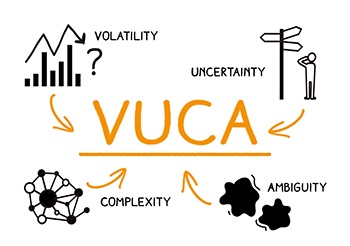<p>By: Doug Baker, Vice President, Industry Relations, FMI</p><img src=”https://www.fmi.org/images/default-source/blog-images/vuca.tmb-large-350-.jpg?sfvrsn=f018ce57_1″ style=”float:right;margin:10px;” alt=”VUCA” class=”-align-right” sf-size=”100″ /><p>Though our food supply chain remains resilient, it has seen its fair share of uncertainty and constraints with no real end in sight. Given this, the acronym ‘VUCA’— which stands for Volatility, Uncertainty, Complexity, and Ambiguity—
has been used recently to describe the current state of the supply chain. VUCA can be used by leaders and managers to alter the traditional supply chain model and gain a competitive advantage by running the business both efficiently and effectively.
It is perhaps more relevant today than ever before.</p><p>With the geopolitical landscape changing at a faster pace, it is hard to predict near and longer-term supply chain disruptions. The industry’s traditional approach to supply chain management that uses the past to predict the future is not as relevant
as it once was. Still, we have a tremendous opportunity to learn from the last two years and build long-term capacity and resilience in the food industry supply chain. This requires breakthrough thinking, and companies must carefully strategize to
be ready for changes in the market while keeping everything moving forward.<br /></p><p>With business and consumer expectations quickly changing, there is a need for supply chains to perform with greater speed and efficiency than ever before. Innovation is required to maximize commercial business strategies and enable profitable growth.
Companies must learn to operate in a VUCA environment requiring different skills, partnerships, and tools than those required in a more stable environment to address the consequences of unpredictability.<br /></p><p>At the <a href=”https://www.fmi.org/forms/RedirectForm/?dest=https%3A%2F%2Fwww.fmi.org%2Fsupply-chain-forum&utm_campaign=supplychainforum22&utm_source=SupplyChainForum22_October22Blog_VUCA&utm_medium=blog”>2022 FMI Supply Chain Forum</a>,
<b>October 18-20, 2022, in Arlington, VA,</b> John Phillips, senior vice president of customer supply chain & go-to market for PepsiCo, will examine how companies can navigate the VUCA supply chain in a post pandemic era. Together we will discuss:<br /></p><ul><li>How the pandemic changed employee expectations and showcased labor’s importance in every aspect of the value chain.</li><li>How companies can maintain resilience by adapting to elevated employee expectations and leverage technologies enabling automation.</li><li>How industry leaders can leverage trends and technologies to be at the forefront of driving transformative change in their organizations. <br /></li></ul><p>The event will feature open, honest, and timely conversations with industry partners to address immediate needs to restore supply chain equilibrium and product flow, unlocking efficiencies and build long-term capacity and resilience. <br /></p><p>We welcome senior and mid-level executives in supply chain, logistics, merchandising, procurement, retail operations, transportation warehousing, and sales, customer supply chain to join in the discussion this month at the <a href=”https://www.fmi.org/forms/RedirectForm/?dest=https%3A%2F%2Fwww.fmi.org%2Fsupply-chain-forum&utm_campaign=supplychainforum22&utm_source=SupplyChainForum22_October22Blog_VUCA&utm_medium=blog”>2022 FMI Supply Chain Forum</a>.<br /></p><p><a href=”https://www.fmi.org/forms/RedirectForm/?dest=https%3A%2F%2Fwww.fmi.org%2Fsupply-chain-forum&utm_campaign=supplychainforum22&utm_source=SupplyChainForum22_October22Blog_VUCA&utm_medium=blog” class=”button”>Register Online</a></p><p> </p>
Oct 5, 2022
By: Doug Baker, Vice President, Industry Relations, FMI
Though our food supply chain remains resilient, it has seen its fair share of uncertainty and constraints with no real end in sight. Given this, the acronym ‘VUCA’– which stands for Volatility, Uncertainty, Complexity, and Ambiguity–
has been used recently to describe the current state of the supply chain. VUCA can be used by leaders and managers to alter the traditional supply chain model and gain a competitive advantage by running the business both efficiently and effectively.
It is perhaps more relevant today than ever before.
With the geopolitical landscape changing at a faster pace, it is hard to predict near and longer-term supply chain disruptions. The industry’s traditional approach to supply chain management that uses the past to predict the future is not as relevant
as it once was. Still, we have a tremendous opportunity to learn from the last two years and build long-term capacity and resilience in the food industry supply chain. This requires breakthrough thinking, and companies must carefully strategize to
be ready for changes in the market while keeping everything moving forward.
With business and consumer expectations quickly changing, there is a need for supply chains to perform with greater speed and efficiency than ever before. Innovation is required to maximize commercial business strategies and enable profitable growth.
Companies must learn to operate in a VUCA environment requiring different skills, partnerships, and tools than those required in a more stable environment to address the consequences of unpredictability.
At the 2022 FMI Supply Chain Forum,
October 18-20, 2022, in Arlington, VA, John Phillips, senior vice president of customer supply chain & go-to market for PepsiCo, will examine how companies can navigate the VUCA supply chain in a post pandemic era. Together we will discuss:
How the pandemic changed employee expectations and showcased labor’s importance in every aspect of the value chain.How companies can maintain resilience by adapting to elevated employee expectations and leverage technologies enabling automation.How industry leaders can leverage trends and technologies to be at the forefront of driving transformative change in their organizations.
The event will feature open, honest, and timely conversations with industry partners to address immediate needs to restore supply chain equilibrium and product flow, unlocking efficiencies and build long-term capacity and resilience.
We welcome senior and mid-level executives in supply chain, logistics, merchandising, procurement, retail operations, transportation warehousing, and sales, customer supply chain to join in the discussion this month at the 2022 FMI Supply Chain Forum.



